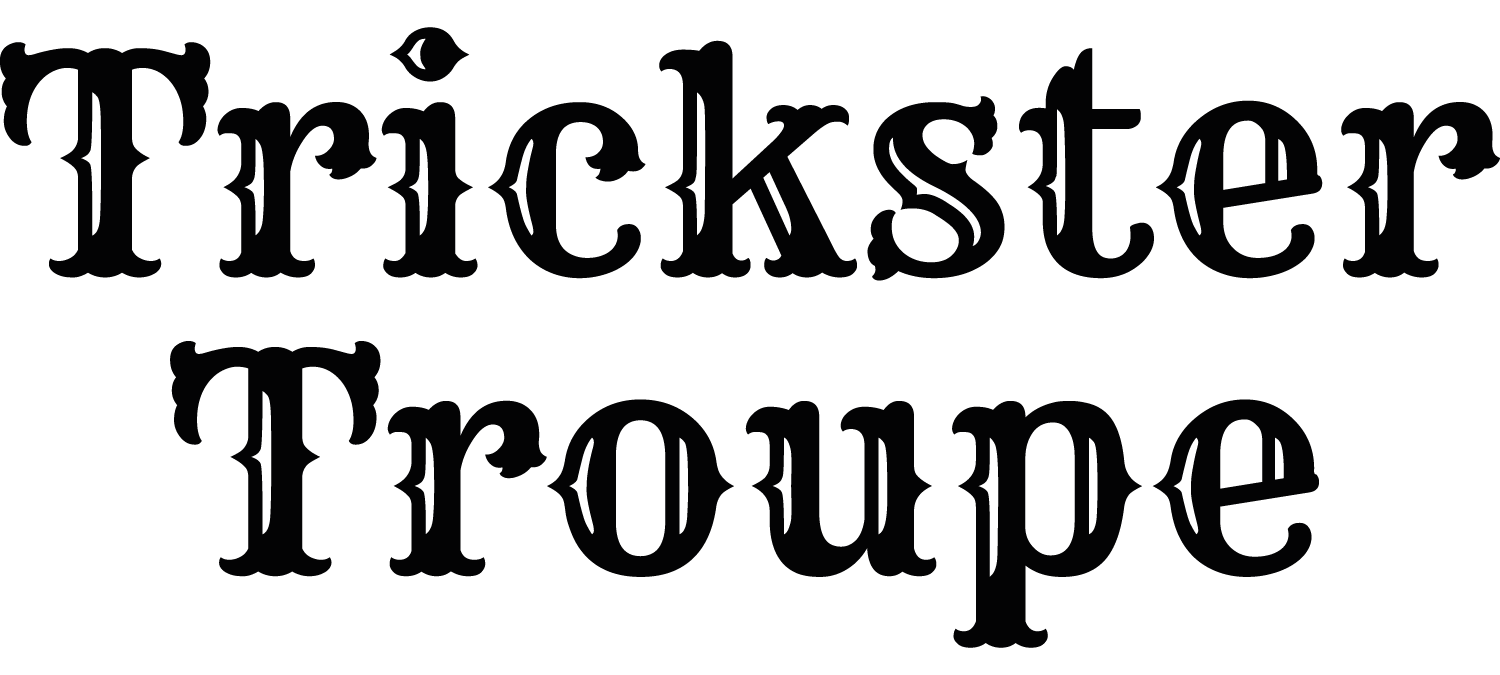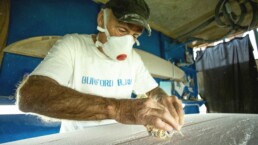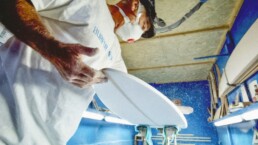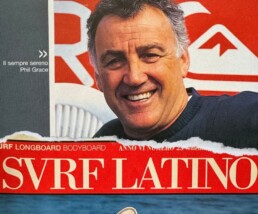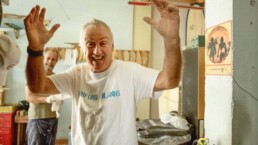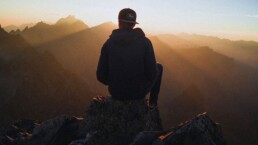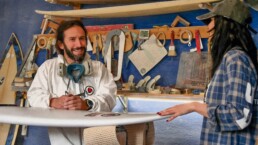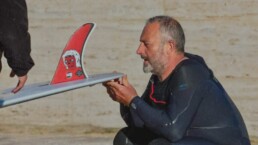Our project, Shapers Around the World, has taken us overseas, and in a heartbeat, we find ourselves face to face with the legendary Phil Grace – the co-founder of Quiksilver and current shaper at Euroglass. This board factory is home to some of the best shapers in the world, including Christian Bradley, Mark Phipps, Mark Richards, and Simon Anderson.
Almost sixty years of shaping experience, Phil embodies the evolution of surfing history through his blue eyes. He’s witnessed it all – from the most famous surf spots that were once unknown to groundbreaking competitions and the iconic prototypes that shaped the surfboard industry.
Splitting his time between Australia and France, he dedicates about eight months a year to crafting boards at Euroglass.
What makes them legends
It’s easy to understand what kind of person Phil Grace is when, in response to our request for a interview, he replies «Of course! Call me whenever you want. If I don’t answer, I’m probably surfing or riding my motorcycle».
He gives me his number to schedule the interview, and I sweat a little as I write him a very simple WhatsApp message.
«Hey Phil! It’s Silvia here». I write, but delete it – too casual.
«Good morning, Phil. It’s Silvia». I type next, but delete again – too formal.
Finally, at six in the morning, I muster the courage to dial his number. Moments later, I’m talking to the legend himself – “Gracie” to those who know him well. His warm smile instantly puts us at ease, and we dive into a conversation filled with his incredible energy.
“Lucky” is the word that spills from his lips most often when he reflects on his life. «I’m flattered, guys, but I’m just one of many» he insists. «I was just very lucky to come in this era, you know, when the surfboard was just progressing into the modern». Hearing him say “just” is surreal; it reverberates in our minds, leaving us in disbelief.
Join us on this journey that began back in the 1960s.
Phil’s eyes exude a calming serenity, effortlessly creating a kind of hypnotic placebo effect. The essence of surf culture threads through the 1960s to the 1980s, a time when surfers were few and the world’s most famous spots were still wild and untamed. «Oh God, you have to take me back to the ’60s and ’80s when there weren’t so many surfers, and most of the places weren’t crowded».
The 1960s marked a turning point for surfing, becoming a mass cultural phenomenon. With the Beach Boys on the radio, surfboard design evolving rapidly, competitions popping up, and surfers venturing around the globe in search of new waves, the surf community began to flourish, passing down its culture through generations. It was a quiet revolution that never stopped – imagine a boulder rolling downhill, gaining momentum like a level in Crash Bandicoot.
Long live Gracie!
We hand Phil a printed copy of an old interview from Surf Latino dated 2001. At first, he struggles to recognize himself, but after a moment’s hesitation, he bursts into laughter:
«God, they must have put some male model there who looks like me!»
It’s been 22 years since that interview, where he talked about shaping boards for Gary Elkerton, a prodigious Australian surfer and three-time world masters champion.
Our time with Phil really flies by, but we even manage to take a virtual tour of his shaping room, where he beams with pride as he shares that the best part of his job is testing his own creations.
«I’m lucky enough to be working in something that I like doing. So I have no excuses – I make the boards, I have to test the products! So that means I have to go surfing!»
His signature board, the Demibu, is a true bestseller.
When we think of Phil Grace, we picture the long, classic surfboards from the 1960s, a hallmark of his craft. But we can’t talk about Phil without mentioning the Demibu. This flagship model, branded “Gracie”, began as a simple solution to fit a wide board into his car – he cut a longboard in half.
The result? A board designed for pure enjoyment, perfect for small to medium waves, embodying the recipe for happiness. The Demibu offers a delightful blend of paddling power and maneuverability, making it a hit with both beginners and experts alike.
Phil tell us about the magic of saltwater, claiming there’s an element that lifts your mood instantly. «A friend of mine used to tell me there’s something in the water – I forgot the name of the element – that makes you feel good. It’s like a drug. You sit out there and feel fantastic, even if the waves are bad». We can’t help but laugh in agreement, feeling a shared understanding.
Remarkably, Phil recalls many of the surf spots he visited in Italy, never forgetting the friends he made along the way, like Diddo, the legendary owner of Surfspot in Cagliari, and Dr. ank, a Tuscan shaper. He shares fond memories of parties, BBQs, pizza, and enjoying fantastic beer. Ah, beer – the elixir of friendship that has connected us all, from Fisio to Mark G, leading us to Phil Grace.
The more time we spend with him, the more it feels like we’re with an old friend – someone as special as your first desk mate in elementary school. Do you remember yours? For those eager to immerse themselves in this world, Phil advises finding a job close to the surf spot, ideally one that allows for remote work. We think that’s a fantastic idea – our boss, maybe less so.
As our conversation wraps up, Phil invites us to visit him. We can’t wait to take him up on that offer, hoping for the honor of catching a few waves together. In the meantime, we express our immense gratitude for his humility, humanity, and wealth of experience.
Thank you, Phil.
By the way, this article is dedicated to my elementary school desk mate, Giomaria, without whom Trickster Troupe wouldn’t quite make the same sense!
⸻ Get in touch
Ultime dal blog
Introducing Outdoor Society Project
27 February 2025
Fisio – The guru of shaping made in Sardinia
1 November 2024
Mark G – The longboard reverend
21 October 2024
